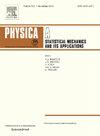Multi-hop centralized seeding strategy for influence maximization in information limited networks
IF 3.1
3区 物理与天体物理
Q2 PHYSICS, MULTIDISCIPLINARY
Physica A: Statistical Mechanics and its Applications
Pub Date : 2025-09-20
DOI:10.1016/j.physa.2025.130967
引用次数: 0
Abstract
Maximizing influence in complex social networks represents a fundamental challenge in the field of information dissemination, particularly in real-world scenarios where network topology and propagation mechanisms are often unknown. Traditional methods, which rely on global network information, face significant limitations such as high data acquisition costs and substantial computational complexity, rendering them inadequate for dynamic and unknown networks. To address these challenges, we propose a Multi-Hop Strategy (MHS) framework based on multi-hop perception, which overcomes the limitations of one-hop approaches by integrating the friendship paradox in social networks with human perceptual capabilities. The developed method dynamically selects high-influence seed nodes using local perceptual data, eliminating the need for global topological information. To validate the effectiveness of the proposed framework, extensive experiments are conducted on 12 real world networks spanning diverse domains. Our results show that MHS significantly outperforms four random baseline strategies and the one-hop strategy across most networks, while exhibiting strong robustness to network sparsity and heterogeneity.
信息有限网络中影响最大化的多跳集中播种策略
在复杂的社会网络中最大限度地发挥影响力是信息传播领域的一个基本挑战,特别是在网络拓扑和传播机制往往未知的现实场景中。传统方法依赖于全局网络信息,存在数据采集成本高、计算量大等局限性,无法适应动态和未知网络。为了解决这些挑战,我们提出了一个基于多跳感知的多跳策略(MHS)框架,该框架通过将社交网络中的友谊悖论与人类感知能力相结合,克服了单跳方法的局限性。该方法利用局部感知数据动态选择影响较大的种子节点,消除了对全局拓扑信息的需要。为了验证所提出框架的有效性,在12个跨越不同领域的真实世界网络上进行了广泛的实验。我们的研究结果表明,MHS在大多数网络中显著优于四随机基线策略和一跳策略,同时对网络稀疏性和异质性表现出很强的鲁棒性。
本文章由计算机程序翻译,如有差异,请以英文原文为准。
求助全文
约1分钟内获得全文
求助全文
来源期刊
CiteScore
7.20
自引率
9.10%
发文量
852
审稿时长
6.6 months
期刊介绍:
Physica A: Statistical Mechanics and its Applications
Recognized by the European Physical Society
Physica A publishes research in the field of statistical mechanics and its applications.
Statistical mechanics sets out to explain the behaviour of macroscopic systems by studying the statistical properties of their microscopic constituents.
Applications of the techniques of statistical mechanics are widespread, and include: applications to physical systems such as solids, liquids and gases; applications to chemical and biological systems (colloids, interfaces, complex fluids, polymers and biopolymers, cell physics); and other interdisciplinary applications to for instance biological, economical and sociological systems.

 求助内容:
求助内容: 应助结果提醒方式:
应助结果提醒方式:


